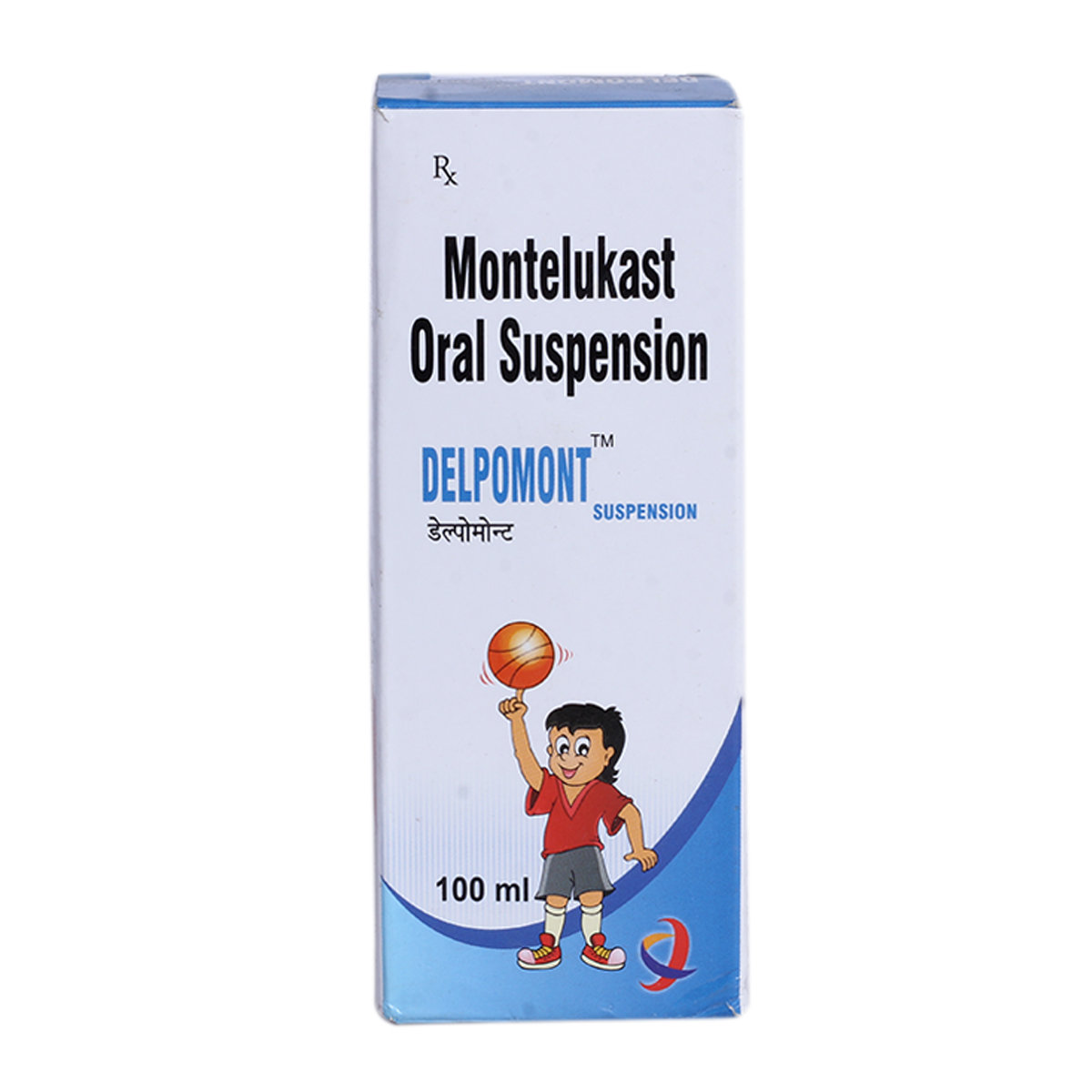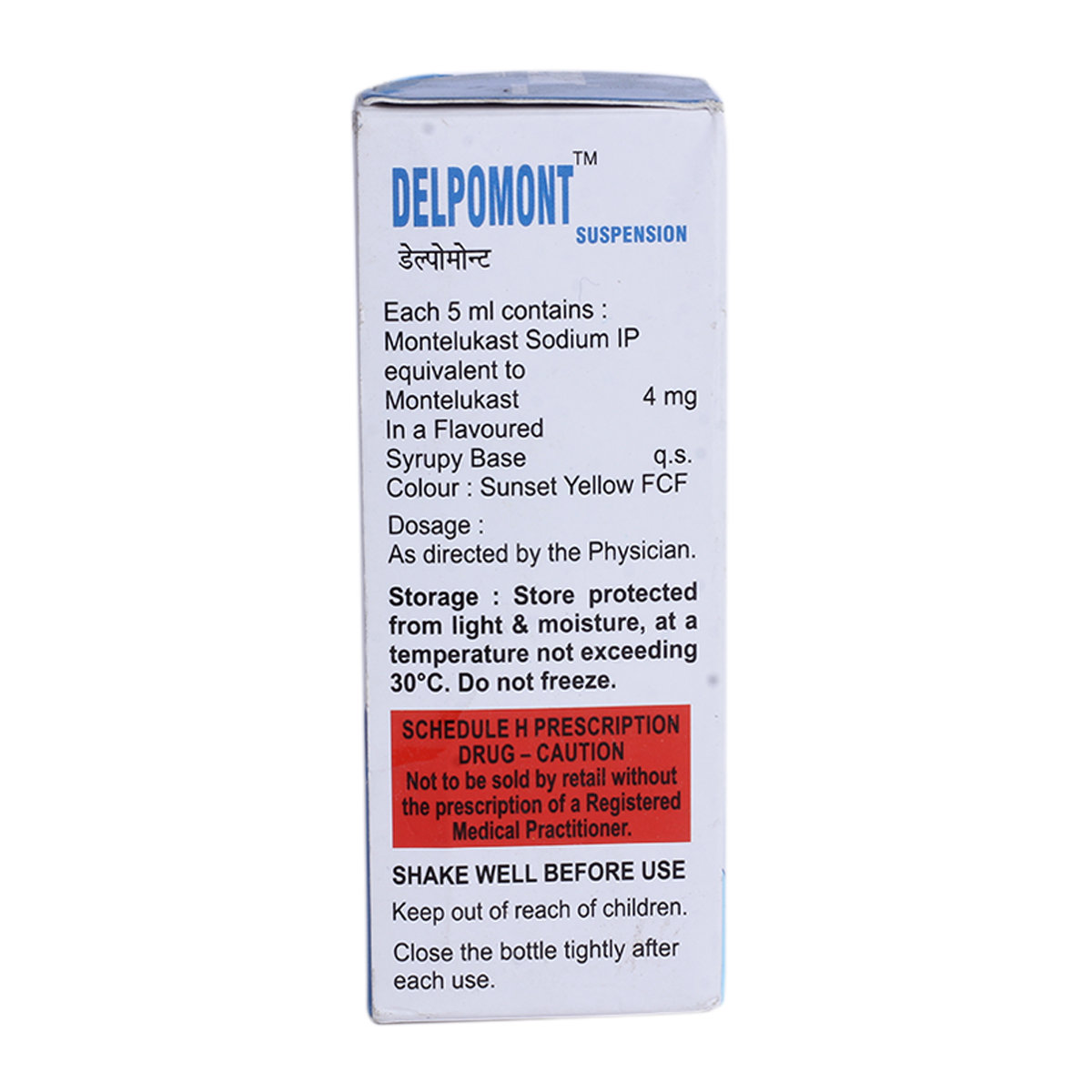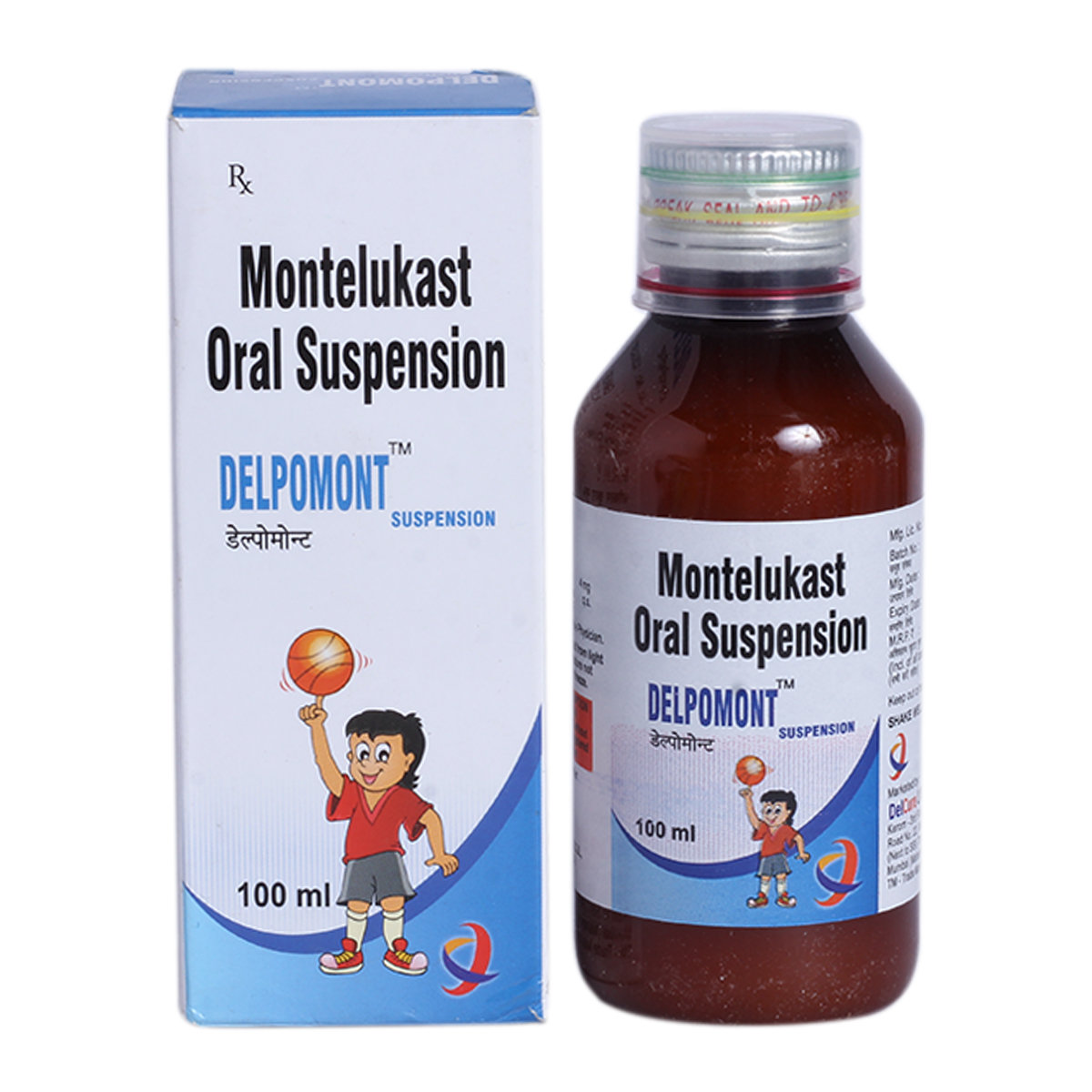Delpomont Oral Suspension 100 ml
MRP ₹120
(Inclusive of all Taxes)
₹18.0 Cashback (15%)
Selected Pack Size:100 ml
100 ml ₹108
(₹1.08 per ml)
In Stock
60 ml ₹108
(₹1.8 per ml)
In Stock
Provide Delivery Location
Online payment accepted
 Prescription drug
Prescription drugWhats That
Composition :
Manufacturer/Marketer :
Consume Type :
Expires on or after :
Return Policy :
About Delpomont Oral Suspension
Delpomont Oral Suspension contains an anti-allergic medication primarily used to treat seasonal allergies and Asthma. An allergy is an immune system response to foreign elements typically not harmful to your body. These foreign elements are known as ‘allergens’ Asthma is a local inflammatory disease of the lungs & airways associated with exaggerated airway-narrowing and may produce extra mucus due to specific triggers like viruses, allergens & exercise.
Delpomont Oral Suspension contains a leukotriene antagonist, Montelukast. It works by blocking a chemical messenger (leukotriene) and reduces inflammation and swelling of airways in the lungs. This makes breathing easier and prevents asthma attacks. Leukotrienes are also released in your body when you have an allergic reaction to something like dust or pollen. Delpomont Oral Suspension helps to reduce the level of leukotrienes and stops you from getting symptoms.
Take Delpomont Oral Suspension as prescribed by your doctor. You are advised to take Delpomont Oral Suspension for as long as your doctor has prescribed it for you, depending upon your medical condition. Can be taken with or without food. In some cases, you may experience certain common side effects such as diarrhoea, headache, abdominal cramp, flu-like symptoms, nausea, dizziness, and vomiting. Most of these side effects do not require medical attention and will resolve gradually over time. However, you are advised to talk to your doctor if you experience these side effects persistently.
Before starting Delpomont Oral Suspension , inform your doctor if you have severe liver problems. Concurrent use of Delpomont Oral Suspension with alcohol or other antidepressants should be avoided as they may reduce your mental alertness. Even if you are asymptomatic and feel good, do not stop taking Delpomont Oral Suspension as it stopping suddenly may lead to an acute attack of Asthma. If you have any mental disorder, inform your doctor before starting Delpomont Oral Suspension as Delpomont Oral Suspension can cause mood changes (symptoms include anxiety, aggressive behaviour, irritability, and restlessness). Sometimes you might feel depressed. Inform your doctor if you feel any of these symptoms.
Uses of Delpomont Oral Suspension
Directions for Use
Key Benefits
Delpomont Oral Suspension is an anti-allergic medication that contains Montelukast. Montelukast is a leukotriene antagonist, which blocks a chemical messenger (leukotriene) and reduces inflammation and swelling in the nose and lungs, making it easy to breathe and help them to improve symptoms and treat a broad range of allergic conditions, thereby minimizing symptoms like sneezing, runny nose, coughing, watery eyes, etc. It is known as a preventer medication, which helps to prevent symptoms of asthma and allergies.
Storage
- Hydrate your body: Drink enough water to prevent dehydration and headaches.
- Calm Your Mind: Deep breathing and meditation can help you relax and relieve stress.
- Rest and Recharge: Sleep for 7-8 hours to reduce headache triggers.
- Take rest: lie down in a quiet, dark environment.
- Cold or warm compresses can help reduce tension.
- Stay Upright: Maintain good posture to keep symptoms from getting worse.
- To treat headaches naturally, try acupuncture or massage therapy.
- Over-the-counter pain relievers include acetaminophen and ibuprofen.
- Prescription Assistance: Speak with your doctor about more substantial drug alternatives.
- Severe Headaches: Seek emergency medical assistance for sudden, severe headaches.
- Frequent Headaches: If you get reoccurring headaches, consult your doctor.
- Headaches with Symptoms: Seek medical attention if your headaches include fever, disorientation, or weakness.
- Inform your doctor about dizziness symptoms. They may adjust your medication regimen or prescribe additional medications to manage symptoms.
- Follow your doctor's instructions for taking medication, and take it at the same time every day to minimize dizziness.
- When standing up, do so slowly and carefully to avoid sudden dizziness.
- Avoid making sudden movements, such as turning or bending quickly, which can exacerbate dizziness.
- Drink plenty of water throughout the day to stay hydrated and help alleviate dizziness symptoms.
- If you're feeling dizzy, sit or lie down and rest until the dizziness passes.
- Track when dizziness occurs and any factors that may trigger it, and share this information with your doctor to help manage symptoms.
- Rash caused by allergies is due to irritants or allergens. Therefore, avoid contact with such irritants.
- Consult your doctor for proper medication and apply an anti-itch medication. Follow the schedule and use the medication whenever needed.
- Protect your skin from extreme heat and try to apply wet compresses.
- Soak in the cool bath, which gives a soothing impact to the affected area.
- Consult a healthcare professional to diagnose the skin infection and receive appropriate treatment.
- Follow your doctor's instructions for treatments including creams, ointments, or antibiotics to stop the spread of germs.
- Avoid scratching to help stop further infection and irritation.
- Particularly after handling the affected region, wash your hands frequently.
- To stop the spreading of infection, avoid sharing personal items including towels, clothes, and makeup.
- Keep your skin moist to avoid dryness and irritations.
- If your symptoms worsen or don't change, let your doctor know as they provide medical attention.
- Avoid trigger foods that can cause allergic reactions, such as nuts, shellfish, or dairy products.
- Keep a food diary to track potential food allergens.
- Include omega-3 rich foods like salmon and walnuts to reduce inflammation.
- Wear loose, comfortable clothing made from soft fabrics like cotton.
- Apply cool compresses or take cool baths to reduce itching.
- Use gentle soaps and avoid harsh skin products.
- Reduce stress through relaxation techniques like meditation or deep breathing.
Drug Warnings
Do not take Delpomont Oral Suspension if you are allergic to Delpomont Oral Suspension or any of its ingredients. If you have any mental disorder, inform your doctor before starting Delpomont Oral Suspension as Delpomont Oral Suspension can cause mood changes (symptoms include anxiety, aggressive behaviour, irritability, restlessness). Sometimes you might feel depressed. Inform your doctor if you feel any of these symptoms. It is advised to avoid contact with known allergens (allergy-causing agents) such as pollen, dust, etc. Certain food items are known to cause allergies. Concurrent use of Delpomont Oral Suspension with alcohol or other antidepressants should be avoided to reduce your mental alertness. Even if you are asymptomatic and feel good, do not stop taking Delpomont Oral Suspension as it stopping abruptly may lead to an acute attack of asthma.
Drug-Drug Interactions
Drug-Drug Interactions
Login/Sign Up
Coadministration of Delpomont Oral Suspension 100 ml and Phenytoin may reduce the blood levels and effects of Delpomont Oral Suspension 100 ml. This can lead to low treatment outcomes.
How to manage the interaction:
Taking Delpomont Oral Suspension 100 ml and Phenytoin may interact with one another, but they can be taken together if your doctor has prescribed them. However, if you experience signs such as headache, fever, sore throat, cough, abdominal pain, diarrhoea, earache, runny nose, or behaviour and mood changes, consult a doctor immediately. Do not discontinue any medications without consulting a doctor.
Coadministration of Delpomont Oral Suspension 100 ml and primidone can reduce the levels and effects of Delpomont Oral Suspension 100 ml.
How to manage the interaction:
Taking Delpomont Oral Suspension 100 ml and Primidone together can possibly result in an interaction, it can be taken if prescribed by a doctor. However, if you experience any unusual symptoms, contact a doctor immediately. Do not discontinue any medications without consulting a doctor.
Coadministration of Delpomont Oral Suspension 100 ml and rifabutin can reduce the levels and effects of Rifabutin. This can lead to low treatment outcomes.
How to manage the interaction:
Taking Delpomont Oral Suspension 100 ml and rifabutin together can possibly result in an interaction, it can be taken if your doctor has advised it. However, if you experience increased side effects such as headache, fever, sore throat, cough, abdominal pain, diarrhea, earache, runny nose, or behavior and mood changes consult a doctor. Do not discontinue any medications without consulting a doctor.
Coadministration of Miconazole with Delpomont Oral Suspension 100 ml may increase the blood levels and effects of Delpomont Oral Suspension 100 ml. This increases the risk or severity of side effects.
How to manage the interaction:
Although there is a possible interaction between miconazole and Delpomont Oral Suspension 100 ml, you can take these medicines together if prescribed by your doctor. However, if you experience any symptoms such as fever, sore throat, cough, stomach pain, diarrhea, earache, runny nose, or uncommon, depression, confusion, difficulty concentrating, anxiety, hallucinations, irritability. memory impairment, restlessness, sleep walking, Consult a doctor immediately. Do not stop using medications without a doctor's advice.
Coadministration of Rifapentine with Delpomont Oral Suspension 100 ml may reduce the blood levels and effects of Delpomont Oral Suspension 100 ml. This can lead to low treatment outcomes.
How to manage the interaction:
Taking Rifapentine with Delpomont Oral Suspension 100 ml together can possibly result in an interaction, it can be taken if your doctor has advised it. If you experience increased side effects such as headache, fever, sore throat, cough, abdominal pain, diarrhea, earaches, runny nose, or behavior and mood changes consult a doctor. Do not discontinue any medications without consulting a doctor.
Drug-Food Interactions
Drug-Food Interactions
Login/Sign Up
Diet & Lifestyle Advise
- Some anti-inflammatory compounds in ginger can relax membranes in the airways, which could reduce coughing.
- The immune system is affected by stress and raises the risk of being sick. An individual can exercise regularly, meditate, do deep breathing and try progressive muscle relaxation techniques to relieve stress.
- To stay fit and safe, try to sleep 7-9 hours each night.
- It is advised to avoid contact with known allergens (allergy-causing agents) such as pollen, dust, etc. Certain food items are known to cause allergies to you.
- Maintain personal hygiene and keep your surroundings clean.
Side Effects of Delpomont Oral Suspension
- Diarrhoea
- Dizziness
- Headache
- Abdominal cramp
- Flu-like symptoms
- Nausea
- Vomiting
Habit Forming
Therapeutic Class
All Substitutes & Brand Comparisons
RX
Out of StockTinomont Oral Suspension 60 ml
Create-In Pharmaceuticals
₹80
(₹1.33/ 1ml)
23% COSTLIERRX
Delpomont Oral Suspension 60 ml
Delcure Life Sciences Ltd
₹120
(₹1.8/ 1ml)
66% COSTLIER
Drug-Diseases Interactions
Drug-Diseases Interactions
Login/Sign Up
FAQs
Delpomont Oral Suspension contains a leukotriene antagonist Montelukast. It works by blocking a chemical messenger (leukotriene) and reduces inflammation and swelling in the nose and lungs. And hence improving symptoms and relieve allergic symptoms.
Although it is very uncommon, Delpomont Oral Suspension can cause mood changes (symptoms include anxiety, aggressive behavior, irritability, restlessness). Sometimes you might feel depressed. Inform your doctor if you feel any of these symptoms.
Delpomont Oral Suspension can be safely taken as long as your doctor has prescribed it to you. However, please do not discontinue it or exceed the duration without consulting your physician.
Usually, Delpomont Oral Suspension does not cause drowsiness, but in a few cases, drowsiness and sleepiness have been reported; hence, it is best to take it in the evening or at bedtime.
Therapy with leukotriene receptor antagonists like Montelukast may worsen the symptoms of psychotic events in patients with a history of mental illness. Careful administration and monitoring are essential before taking Delpomont Oral Suspension in patients with neuropsychiatric disorders. Please consult your doctor before taking Delpomont Oral Suspension if you have been diagnosed or have a history of mental illness like depression, seizures (fits), etc.
Drug-Drug Interactions Checker List
- IBUPROFEN
- NAPROXEN
- DICLOFENAC
- ASPIRIN
- CETIRIZINE
- SALMETEROL
- ALBUTEROL
- FORMOTEROL
- METOPROLOL
- PHENOBARBITAL
- PHENYTOIN
Special Advise
- Staying hydrated is vital for those with a cough or cold. Drinking liquids at room temperature can alleviate cough, runny nose, and sneezing.
- If you have phenylketonuria ( an inborn error of metabolism that results in decreased metabolism of the amino acid phenylalanine), you should know that chewable tablets contain aspartame, which is not recommended in such conditions.
Disease/Condition Glossary
Asthma: It is a local inflammatory disease of the lungs & airways associated with exaggerated airway narrowing to certain triggers like viruses, allergens & exercise. Asthma leads to frequent wheezing, breathlessness, tightness of the chest and coughing episodes that differ over time in severity. Asthmatic attacks and narrowing of airway passages are brought about by the production & secretion of certain chemicals inside the lungs called leukotrienes. This condition is characterized by wheezing, breathlessness, chest tightness & cough with or without sputum.
Allergy: It is an immune system response to foreign elements typically not harmful to your body. These foreign elements are known as ‘allergens’ Allergic condition varies from person to person. Some might be allergic to certain foods and seasonal allergies like hay fever. While others might be allergic to pollen or pet dander. One of the symptoms of allergy is cough. Coughing occurs as a reflex action in the throat when there is mucus or any other foreign irritant in it.

Have a query?
Alcohol
Safe if prescribed
Avoid drinking alcohol while taking Delpomont Oral Suspension as it can worsen your side effects like drowsiness.
Pregnancy
Consult your doctor
There is limited data on how Delpomont Oral Suspension affects pregnancy. Please consult your doctor if you are planning to conceive or already pregnant before starting Delpomont Oral Suspension .
Breast Feeding
Consult your doctor
There is limited data on how Delpomont Oral Suspension affects breastfeeding. However, Montelukast may pass into breast milk. Please consult your doctor before starting Delpomont Oral Suspension .
Driving
Safe if prescribed
Do not drive or operate machinery if you experience drowsiness or difficulty in concentrating while using Delpomont Oral Suspension . Delpomont Oral Suspension may affect your ability to drive. Seek medical attention if the symptoms persist longer.
Liver
Consult your doctor
Delpomont Oral Suspension should be used with caution in patients with liver diseases. Let your doctor know if you have any history of liver diseases. Your doctor will weigh the benefits and potential risks before prescribing Delpomont Oral Suspension .
Kidney
Consult your doctor
Delpomont Oral Suspension should be used with caution in patients with kidney diseases. Let your doctor know if you have any history of kidney diseases. Your doctor will weigh the benefits and potential risks before prescribing Delpomont Oral Suspension .
Children
Safe if prescribed
Delpomont Oral Suspension is not recommended for use for children less than two years of age. The dose may have to be adjusted by your doctor depending upon the condition of the child's disease and age.











